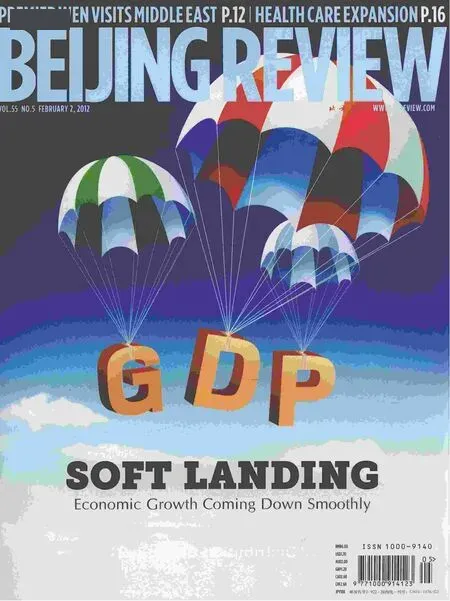Nation First
Properly managed nationalism can be a positive force in China By He Tao
Nation First
Properly managed nationalism can be a positive force in China By He Tao
In addition to the success of economic integration, the cultural effects of globalization have been considerable. The increasingly globalized culture creates the potential to alter the way people identify themselves,eroding geographic boundaries as well as local and national cultures. While the West was happily appreciating this gift from globalization, they found themselves involved in an unexpected wave of reemerging nationalism in many countries.
With different reasons and targets, nationalist movements have ramped up in China, Japan,South Korea, Viet Nam, Russia and some other Eurasian countries since the 1990s. Among these movements, China has received the most attention and harshest criticism from the West.
Curse or blessing
Many in the West were shocked to discover an Internet posting with more than 20 million Chinese signatures opposing Japan’s bid to join the UN Security Council in 2005.Massive anti-U.S. demonstrations and a public boycott for French commodities added to their astonishment. The West, having been accustomed to accusing China’s “authoritative regime,” was shocked when confronted with the popular outcry of the Chinese people.
While acknowledging China has legitimate grievances against Western powers,some Western observers tried to justify themselves by asserting the national sentiment was manipulated by an invisible hand. According to them, as Communist ideology quickly lost its credibility after Deng Xiaoping launched market-oriented economic reforms in the late 1970s, Deng and his successors wrapped themselves in the mantle of pragmatic nationalism, which they found remained the most reliable claim to the Chinese people’s loyalty.

The author is an official with the Ministry of National Defense of China
The West generally holds a negative view on nationalism,which actually was the product of the West’s own culture.Nationalism as a doctrine was fi rst introduced in Europe at the turn of the 19th century, and soon evolved into a national identi fi cation movement against the Vatican and theocracy.
At that time, people first acknowledged themselves as Christians, and then residents of certain regions, and reluctantly admitted being French or British. An ideology was thus needed to claim the loyalty to build unified and secular political entities. Advanced by nationalism, Britain and France became the strongest national states while Germany and Italy accomplished their national unity later in the 19th century, laying the foundation for the current world pattern.
The historical mission of nationalism for Western countries fi nally ended as a new wave of colonialism surged. Then nationalism began to be interpreted as a “devil” when worldwide nationalist movements were suppressed by suzerains after World War II.In the age of globalization, a new round of nationalism has been intensely scrutinized, as it may turn out to be beyond the control of not only its home country, but also the dominance of Western countries, which is detrimental to their global interests.
Should nationalism be simply condemned?
As a natural outcome of human development, nationalism can be interpreted in two aspects. Psychologically, it is a kind of consciousness advocating national interests,independence and unity. Politically, it is a movement dedicated to the establishment of a national state and the enhancement of national strength and wealth. Its essence is to emphasize national cohesiveness and cultural identi fi cation as the underlying force to achieve development.
So there is no absolute good or evil for nationalism itself. What matters, however,is how far it goes, or whether this love for one’s own nation turns into a wild hatred of other countries. All we need to do is to prevent nationalism from going to the extremes—militarism combined with racism previously adopted by Japan and Germany,and from being blended with other dangerous ideologies like fundamentalism or state terrorism.
A deep-rooted tradition
Despite some claims that nationalism did not exist in China before the 19th century, it is deeply rooted in Chinese cultural traditions.Unlike Japan, China’s 5,000-year history is a combination of both cultural integration and ethnic collision, as evidenced by the wars against Khitans, Jurchens, Mongols and Manchu people. But it was not until the Opium War of 1840 that the hibernating nationalist quest was awakened. Following the war, the Chinese suffered a century of shame and humiliation. It is this “victim psychology,” mixed with long-dormant nationalist traditions, that makes China’s reactions to outside stimuli sometimes beyond Western comprehension.
Based on the spontaneous nationalist quest, nationalism as an ideology was fi rst officially established in China in the early 20th century. To the surprise of some, it was not introduced by the Communist Party of China,but by Sun Yat-sen and his Kuomintang,which somewhat illustrates that nationalism would be embraced by the Chinese no matter what form their government takes.
It is true that the Chinese Government has highlighted the promotion of patriotism and national spirit, which have contributed to national unity and ethnic solidarity since the founding of the People’s Republic of China in 1949. And it cannot be denied that some of the cultural products in China potentially promote anti-West or anti-Japanese emotions.But the role of government in this regard should not be overstated. One example is that the wave of nationalism in the new century started from overseas Chinese, who witnessed how Western media created stories to demonize China.
One may also note that it is a common practice by smart governments to publicize their achievements and enhance their citizens’ sense of belonging to the state.Furthermore, as one scholar has stated,“For Western or Japanese analysts who fear that Beijing is inciting a rampant rise in Chinese nationalism, the reality is that Beijing is seeking to rein in rising Chinese nationalism.” It is not in the interest of the government to ignore the risk of irrational nationalism to “kidnap” its foreign policy,because it would draw more criticism to and increasing pressure on diplomacy from both home and abroad.
So why has nationalism been heating up in the past two decades in China?
One fundamental reason is the acceleration of China’s integration into the world. Before the beginning of its reform and opening up, China had little interaction with the West. This arti fi cial insulation eliminated the inducement for triggering China’s nationalism. Globalization and the end of the Cold War, however, paved the way for China to enter into the international system. But like a car driving on a crowded highway, the more China maneuvers, the more friction and collisions it encounters,under Western-dominated “traffic lights.”Common Chinese people then find themselves walking out of the former isolation into a new discrimination, reviving their nationalist emotions.
Also, demographic and democratic changes in China account for much of the phenomenon. As the young people born in the 1980s and the 1990s, who experienced the rapid growth of their country, become the most active force in society, the expectations of playing a bigger international role and the incentives to say “no” are naturally on the rise.
The government holds a critical attitude toward nationalism, and comprehensive efforts have been taken to guide national emotions and avoid ultra-nationalism. A newspaper sponsored by the Ministry of Education, for example, urged Chinese students to refrain from the “victim complex”and handle different voices in a more tolerant way.
The West’s role
How the West reacts to China’s nationalism may have a bigger in fl uence than what can be done inside China.
As they often did in other realms, the West has adopted double standards toward nationalism in different countries. With regard to nationalism in Japan, although with a risk of re-militarization, the U.S. response is to just ignore it, and what’s more, the most constructive forms of Japanese nationalism are encouraged.
This is not self-contradictory, as there is actually only one standard: Whether it is in the interest of the West. The Chinese Government is accused of adopting “pragmatic nationalism,” while the West also practices pragmatism on nationalism. If some Western countries and media continue to plant a jungle around China, the alternative to walk with the “big stick” in accordance with the “jungle law” would seem appealing for the Chinese, regardless of the efforts made by the government to limit extreme expressions of nationalism.
If some Western countries and media continue to plant a jungle around China, the alternative to walk with the “big stick” in accordance with the“jungle law” would seem appealing for the Chinese, regardless of the efforts made by the government to limit extreme expressions of nationalism

